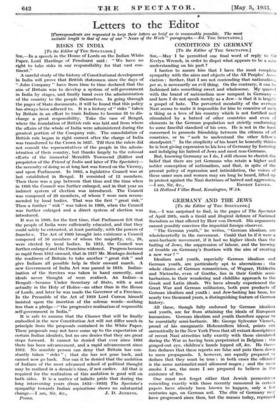Letters to the Editor
[Correspondents are requested to keep their letters as brief as is reasonably possible. The most suitable length is that of one of our " .News of the- Week " paragraphs.—Ed. THE SPECTATOR.]
RISKS IN INDIA
[To the Editor of THE SPECTATOR.]
Sin,—In a speech in the House of Lords on the Indian White Paper, Lord Hardinge of Penshurst said : " We have no right to take risks in our responsibility for that vast con- tinent."
A careful study of the history of Constitutional development in India will prove that British statesmen since the days of " John Company " have from time to time declared that the aim of Britain was to develop a system of self-government in India by stages, and finally hand over the administration of the country to the people themselves. In going through the pages of State documents, it will be found that this policy has always been adhered to. It is a history of " risks " taken by Britain in an effort to train Indians to become fit to dis- charge a great responsibility. Take the case of Bengal, where the foundation of British rule was laid and from where
the affairs of the whole of India were administered during the greatest portion of the Company rule. The consolidation of British rule began in right earnest after the charge of India was transferred to the Crown in 1857. Till then the rulers did not consult the representatives of the people in the admin- istration of their country, but thanks largely to the colossal efforts of the immortal Meredith Townsend (Editor and proprietor of the'Friend of India and later of The Spectator)— the necessity of doing so at long last was forced on the Viceroy, and upon Parliament. In 1862, a legislative Council was at last established in Bengal. It consisted of 12 members. Then there was a gap between that time and the time when in 1893 the Council was further enlarged, and in that year an indirect system of election was introduced. The Council was composed of 20 members, of whom 7 were men recom- mended by local bodies. That was the first " great risk." Then a further " risk " was taken in 1909, when the Council was further enlarged and a direct system of election was introduced.
It was in 1909, for the first time, that Parliament felt that
the people of India were sufficiently educated, and that they could safely be entrusted, at least partially, with the powers of franchise. The Act of 1909 brought into existence a Council composed of 50 members of whom the majority, viz., 28, were elected by local bodies. In 1912, the Council was further enlarged and the Franchise widened. Progress became so rapid from 1912 onward, that in 1917 Mr. Montagu declared the readiness of Britain to take another " great risk " and give Indians all possible help in their onward march. A new Government of India Act was passed in 1919. Indian- ization of the Services was taken in hand earnestly, and ideals never thought of were realized. An Indian—a Bengali—became Under Secretary of State, with a seat actually in the Holy of Holies—no other than in the House of Lords, and later he was made the Governor of a Province. In the Preamble of the Act of 1919 Lord Curzon himself insisted -upon the insertion of the solemn words—nothing less than a pledge—" the progressive realization of responsible self-government in India."
It is safe to assume that the Clauses that will be finally
embodied in the new Constitution Act will not differ much in principle from the proposals contained in the White Paper.. These proposals may not have come up to the expectation of certain Indian idealists, but no one denies that they are great steps forward. It cannot be denied that ever since 1893 there has been advancement, and a rapid advancement since 1912. No sensible person can deny that Britain has con- stantly taken " risks " ; that she has not gone back, and cannot now go back. Nor can it be denied that the ambition of Indians of the most advanced school of political thought may be realized in a decade's time, if not earlier. All that is required for the realization of this ambition is good will on both sides. It is a matter of infinite pride that during the long intervening years (from 1852-1933) The Spectator's sympathy towards Indian aspirations shows no substantial










































 Previous page
Previous page